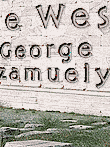The
New York Times, as usual did more than its fair share
of the heavy lifting. Last week, it ran an
article after article dismissing the DU scare. "Physicists
and medical experts say it is biologically impossible for
depleted uranium to have caused the leukemia, and they doubt
that the metal caused any illnesses in Europe," in
the soothing words of one of them. This week, the theme
changed, though the message remained the same, in an excruciatingly
long and tedious story about the supposedly dire straits
Kosovo might find itself in if the United States were to
pull out its forces. "Senior NATO generals, United
Nations officials and Western diplomats say they believe
that the American role in Kosovo is as crucial now as ever,"
the story opens portentously, "and they assert that
President-elect George W. Bush's expressed desire to pull
American troops out of the Balkans is both ill-timed and
damaging to Western goals in the region." How the American
people may feel about garrisoning their troops in the Balkans
in perpetuity is of very little moment compared to the wishes
of such important people as "senior NATO generals,
United Nations officials and Western diplomats."
The
"presence of the world's superpower as a mainstay of
the NATO-led international force keeps Kosovo stable and
secure," the story goes on, "providing the space
for the United Nations effort to rebuild the province and
promote democratic self-government." Cliché
follows tired cliché, there obviously being no time
even to reflect on the absurdity of these assertions. How
can foreign military occupation make a province "stable
and secure"? How can United Nations administration
be compatible with "democratic self-government"?
It
does not matter. What matters is the chilling scenario.
The Times quotes a "senior United Nations official,"
who declares: "‘It's almost precisely the wrong moment
to even discuss the idea of American withdrawal…. The fall
of Milosevic was a shock to the Albanians, and they know
the Europeans are much closer to Belgrade and much more
frightened of independence for Kosovo. If the Americans
left, there would be a resurgence of activity by the Kosovo
Liberation Army that would block democratic politics and
create big problems for the rest of KFOR." This kind
of verbiage has come to be known as NATOspeak. For years
we were told that the US presence in the Balkans –
first in Bosnia, then in Kosovo – was necessary on
account of that dreadful man in Belgrade, Slobodan Milosevic,
forever "making mischief." However, as soon as
Milosevic goes, we are told that the situation is even worse
than before. NATO is now needed more than ever because Kosovo
Albanians need reassurance. This is a small-scale version
of NATO's attempts to justify its existence following the
end of the Cold War. The demise of the Soviet Union, we
were then told, made the world more, not less dangerous.
NATO's doctrine is the reverse of Lenin's: the better, the
worse – the bureaucrat's rationale through the ages
as he clings to his paycheck.
Luckily
for NATO, just in the nick of time it found an unlikely
ally. The new regime in Belgrade, which owes its existence
to last October's US-organized coup, is evidently under
instruction to help NATO out in times of crisis. While public
fury about deleted uranium is sweeping across Europe, its
chief victims are maintaining a studied silence. To be sure,
President Vojislav Kostunica did mumble something about
people using depleted uranium having "a depleted conscience."
One wonders how long it took him to come up with that witty
turn of phrase. The evidence of NATO's "depleted conscience"
is all around him from the bombed out petrochemical plants
to the destroyed bridges in the Danube to the marketplaces
still bearing traces of the cluster bombs. Yet this does
not stop him from partying daily with the leaders of the
countries that took part in that joyous bombing spree. The
new Yugoslav Foreign Minister Goran Svilanovic went on a
pilgrimage to NATO headquarters in Brussels last week and
expressed his confidence in NATO's determination to get
to the bottom of the DU issue. NATO and Yugoslavia agreed
"to set up channels of communication to exchange information"
on DU. "We need to continue this very open discussion,"
Svilanovic explained, "to have guarantees for the local
population that they are safe." NATO's commitment to
ensuring the safety of the Serb population is, of course,
well known and amply documented.
As
is NATO's commitment to the impartial administration of
justice. Yet the new regime in Belgrade seems to be satisfied
that the ICTY and its ghastly chief prosecutor Carla del
Ponte are seriously in the business of investigating war
crimes. The Tribunal was permitted to open an office in
Belgrade and Carla del Ponte is due to visit the country
next week. During his recent trip to Washington, Svilanovic
reassured our leaders that Yugoslavia would cooperate fully
with the ICTY. Svilanovic made no mention of NATO's war
crimes, from the attacks on civilian targets, to the coercive
diplomacy of Rambouillet, to the destruction of TV stations,
to the bombing of power plants, to the use of depleted uranium.
Svilanovic did not ask when del Ponte would get around to
investigating that? Svilanovic also did not mention that
the ICTY has no legal standing since countries can only
cede their sovereignty voluntarily. However, the UN Security
Council simply imposed the ICTY on the countries that constituted
Yugoslavia.
Svilanovic's
undignified – and contemptible – performance was
repeated by one minister after another in Belgrade. Yugoslav
Justice Minister Momcilo Grubac declared that Serbs should
follow the example of Biljana Plavsic and turn themselves
in if indicted by del Ponte. He too seems to be under the
strange, yet craven, delusion that the ICTY is a real Court.
"Biljana Plavsic acted normally, in the way every other
citizen suspected by a court, local or international, should
do," Grubac explained. All indicted individuals should
cooperate with ICTY. Yugoslav Interior Minister Zoran Zivkovic
also vowed to cooperate with the Tribunal. However, he mused
philosophically, "we don't see the Tribunal as the
highest achievement of law and legality as its political
side is all too obvious." Mercifully, Belgrade's answer
to Hugo Grotius, cut short his fascinating ruminations on
international law to announce: "At the end of the day,
we have the most right to bring Milosevic to trial. The
best solution would be to put him on trial here for charges
coming from this state but also for those that might come
from Croatia, Bosnia and The Hague." That's nice. The
new Serb regime intends to put on trial a man who won election
after election, who led the Serb people through the terrible
civil wars of the last decade, on the basis of evidence
supplied by the very people whom the Serbs fought.
The
Prime Minister-designate of Serbia, Zoran Djindic, announced
that "if Mrs. Del Ponte is willing, I will meet with
her." He went on, sounding ever more like a paid agent
of NATO: "The duty of every politician is to discuss
with the representatives of international organizations
and, consequently, with those of the ICTY, which was set
up by the United Nations Security Council." When President
Vojislav Kostunica was asked if he would meet del Ponte
he responded with his usual gobbledygook: "In due course,
I will take care of that question and I am sure adequate
means will be found for Mrs. del Ponte to be informed by
my colleagues on the questions relevant to cooperation"
between Belgrade and the ICTY. Upon hearing of Kostunica's
equivocating words, Djindic declared that these remarks
must have been made in the heat of the moment. "They
do not express state policy," he warned. We thus have
the extraordinary spectacle of a man who as yet holds no
official government position, who has never won an election,
who has never been voted into any office, who has never
commanded popular support in excess of 10 percent, dressing
down a President and explaining what "state policy"
is.
Kostunica
has, of course, brought this humiliation on himself, by
resolutely failing at every turn to adhere to principle
or even pursuing a policy with any consistency. For months
he continued to repeat that the Tribunal was not a "priority"
for him. Such an evasive position inevitably failed to satisfy
anyone. Then he declared that extraditing a Yugoslav national
to a foreign country would violate Yugoslav Constitution.
His DOS colleagues swiftly contradicted him. Justice Minister
Momcilo Grubac pointed out that that the UN tribunal in
The Hague is an international body. Hence the constitutional
ban does not apply. Then Kostunica announced that he was
"too busy" to meet Carla del Ponte during her
visit to Belgrade. While traveling in Greece the other day,
he explained that "on January 19 I will be in Sarajevo...At
an appropriate time we will deal with this issue and then
we will find a way for Carla del Ponte to be informed about
anything concerning the Hague. As the Reuters reporter acidly
observed, "it was not clear why a trip to a neighboring
state on January 19 would prevent Kostunica meeting del
Ponte next week."
Kostunica
then explained that he was unable even to focus his mind
on the del Ponte problem: "I have not thought about
it and I'm not thinking about it." Kostunica's next
assertion was to explain that even if he failed to see del
Ponte this time around he might met her on her next visit:
"I believe there are still some legal shortcomings
in the make-up of the court and I will raise this issue
with Carla del Ponte when she comes again."
It
came as no surprise when Kostunica reversed himself again
and announced that he would meet del Ponte after all. He
masked this humiliation with a lot of empty bluster about
giving del Ponte a piece of his mind. He would raise the
depleted uranium issue as well as the issue of Racak. Moreover,
he explained, he did not much care for her "aggressive
tone" when she informed him that she would be coming
with "sealed indictments." Del Ponte is not known
for her charm or tact. She described to the Belgian daily
Le Soir, how she intended to behave in Belgrade.
She would march into Kostunica's office and "tell him
that these individuals are under indictment by the ICTY.
‘Here are the indictments, here are the arrest warrants.
Do your duty.' I will give him everything, even the secret
indictments." "Sealed indictments" are, of
course, yet another weapon in NATO's war against the Serbs.
They are antithetical to every principle of justice, which
requires that people should know of the charges pending
against them. "Sealed indictments" could be directed
against anybody at all, even Kostunica himself. Indeed,
it would be a perfectly plausible ploy on the part of the
US-funded Tribunal to indict Kostunica secretly, thereby
ensuring he continues to do as he is told.
Yugoslavia
helped NATO out immeasurably this week. But it will not
do the new Belgrade regime much good. NATO is not in a pro-Serb
mood. A foretaste of what may be ahead came this week with
the announcement by the mayor of Subotica and chairman of
the Alliance of Vojvodina Hungarians, Jozef Kasza, that
he had received an e-mail containing a death-threat. Signed
by an organization called the Serbian Liberation Movement,
Kasza went on, the letter urged the expulsion of the Vojvodina
Hungarians, as well as slaughter of the Croats. The Hungarians,
Kasza announced, were being persecuted by members of the
Democratic Party of Serbia (DSS – Kostunica's party.
Kasa intends to show the letter to the OSCE. "We have
felt – and continue to feel – that an incitement
to a hostile attitude towards Hungarians in Vojvodina is
under way," Kasza told Hungarian radio, "This
is not simply an anti-Hungarian threat but a campaign against
ethnic communities on the basis of the Greater Serbian ideology."
Happy days are here again! Stay tuned.
Please
Support Antiwar.com
Send
contributions to
Antiwar.com
520 S. Murphy Avenue, #202
Sunnyvale, CA 94086
or
Contribute Via our Secure Server
Credit Card Donation Form

Your
Contributions are now Tax-Deductible










